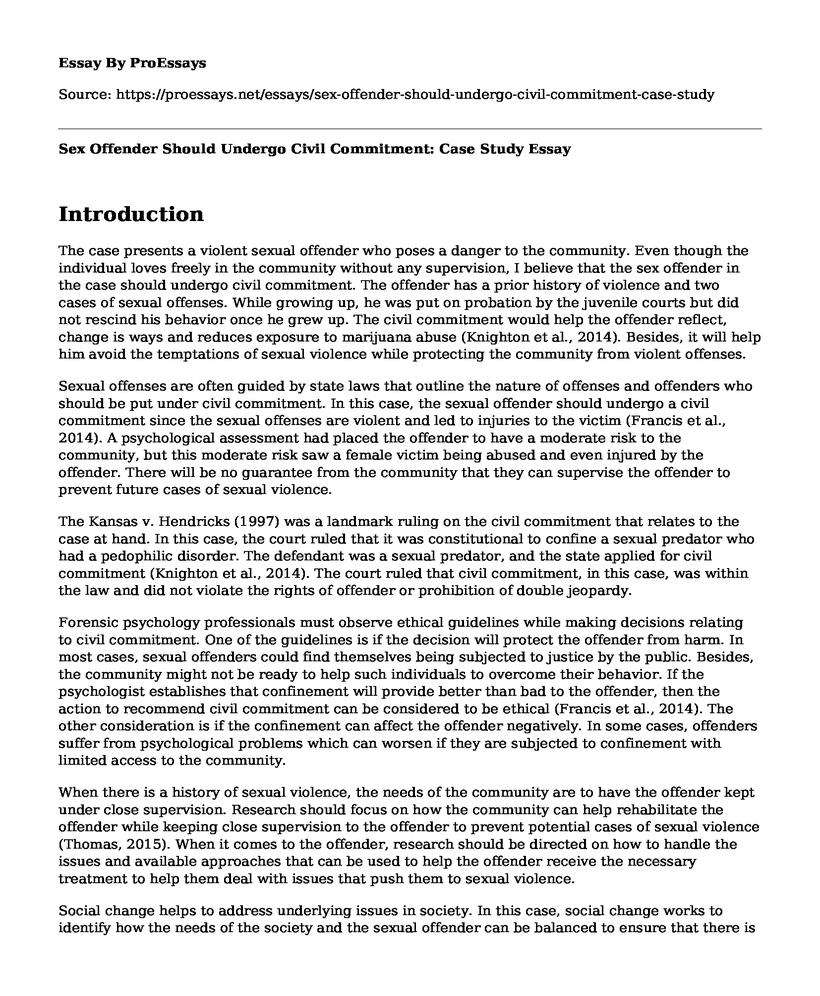Introduction
The case presents a violent sexual offender who poses a danger to the community. Even though the individual loves freely in the community without any supervision, I believe that the sex offender in the case should undergo civil commitment. The offender has a prior history of violence and two cases of sexual offenses. While growing up, he was put on probation by the juvenile courts but did not rescind his behavior once he grew up. The civil commitment would help the offender reflect, change is ways and reduces exposure to marijuana abuse (Knighton et al., 2014). Besides, it will help him avoid the temptations of sexual violence while protecting the community from violent offenses.
Sexual offenses are often guided by state laws that outline the nature of offenses and offenders who should be put under civil commitment. In this case, the sexual offender should undergo a civil commitment since the sexual offenses are violent and led to injuries to the victim (Francis et al., 2014). A psychological assessment had placed the offender to have a moderate risk to the community, but this moderate risk saw a female victim being abused and even injured by the offender. There will be no guarantee from the community that they can supervise the offender to prevent future cases of sexual violence.
The Kansas v. Hendricks (1997) was a landmark ruling on the civil commitment that relates to the case at hand. In this case, the court ruled that it was constitutional to confine a sexual predator who had a pedophilic disorder. The defendant was a sexual predator, and the state applied for civil commitment (Knighton et al., 2014). The court ruled that civil commitment, in this case, was within the law and did not violate the rights of offender or prohibition of double jeopardy.
Forensic psychology professionals must observe ethical guidelines while making decisions relating to civil commitment. One of the guidelines is if the decision will protect the offender from harm. In most cases, sexual offenders could find themselves being subjected to justice by the public. Besides, the community might not be ready to help such individuals to overcome their behavior. If the psychologist establishes that confinement will provide better than bad to the offender, then the action to recommend civil commitment can be considered to be ethical (Francis et al., 2014). The other consideration is if the confinement can affect the offender negatively. In some cases, offenders suffer from psychological problems which can worsen if they are subjected to confinement with limited access to the community.
When there is a history of sexual violence, the needs of the community are to have the offender kept under close supervision. Research should focus on how the community can help rehabilitate the offender while keeping close supervision to the offender to prevent potential cases of sexual violence (Thomas, 2015). When it comes to the offender, research should be directed on how to handle the issues and available approaches that can be used to help the offender receive the necessary treatment to help them deal with issues that push them to sexual violence.
Social change helps to address underlying issues in society. In this case, social change works to identify how the needs of the society and the sexual offender can be balanced to ensure that there is mutual gain by both parties (Thomas, 2015). Social change should focus on protecting society better, but it should not disregard sexual offenders who could be faced with problems that push them to sexual violence.
References
Francis, B., Harris, D. A., Wallace, S., Knight, R. A., & Soothill, K. (2014). Sexual and general offending trajectories of men referred for civil commitment. Sexual Abuse, 26(4), 311-329. https://doi.org/10.1177/1079063213492341
Knighton, J. C., Murrie, D. C., Boccaccini, M. T., & Turner, D. B. (2014). How likely is "likely to reoffend" in sex offender civil commitment trials? Law and Human Behavior, 38(3), 293, doi:10.1037/lhb0000079.
Thomas, T. (2015). Sex crime: Sex offending and society. Routledge. https://doi.org/10.4324/9781315778983
Cite this page
Sex Offender Should Undergo Civil Commitment: Case Study. (2023, Jan 16). Retrieved from https://proessays.net/essays/sex-offender-should-undergo-civil-commitment-case-study
If you are the original author of this essay and no longer wish to have it published on the ProEssays website, please click below to request its removal:
- Essay on Laura Ingraham Rhetoric against Gun Rights
- Essay on Use of Restraints on the Psych/Mental Health Unit
- Definition Essay on Racial Profiling
- Feminist Critique on Frankenstein Essay Example
- Essay Example on Exploring Cognitive-Psychosocial Development: Vygotsky & Erikson
- Essay Example on Rick & Morty: Indictment for Burglary & Other Crimes
- Marriage Story - Free Movie Review Sample







